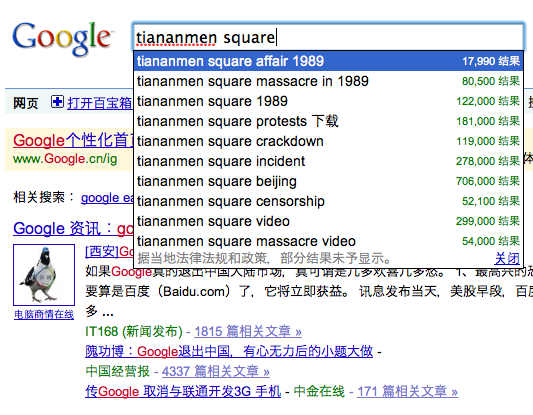
The Google/China story has enough legs to qualify as a "centipede" at this point. After saying that it would no longer censor Chinese search results and that it was ready to pull out of China, Google also admitted to being the victim of a sophisticated cyberattack that went after more than 30 companies.
The immediate aftermath of the announcement was a media feeding frenzy—and that was before the Chinese government's various departments even began reacting to the news. Now that they have, it's clear that Google and China are on a collision course, and that the US government is ready to get involved on Google's side.
If you've had difficulty keeping up with the story, have no fear: here's a roundup of the news you need to know.
Twists, turns, and U-turns
An inside job? It's little more than an anonymously sourced rumor at this point, but Reuters says that insiders from Google's own Chinese office may have been involved in the cyberattack on the company.
Chinese sources have reported that Google China was cut off from Google's internal network last week while Google security staff investigated the allegations and secured the network.
It's for your own good. The Chinese government doesn't look ready to back down from its censorship requirements, and was never likely to do so in such a public way. The government has reaffirmed its need to "guide" the Chinese people through information access, and stressed again that companies need to obey local laws.
Calling out the US. In an ironic twist, given China's lengthy history of explicitly favoring locally owned firms, the Chinese government says the US is "backsliding" toward trade protectionism. It also claims that "multinationals' parent countries, including 'Google’s home country' should step up oversight of overseas businesses," according to Bloomberg.
Hey, we're the victims! According to Xinhua, China's official news outlet, the Foreign Ministry is talking up the number of hacking attacks that China suffers. "China's Internet is seriously threatened by cyber attacks like other countries," said a spokesperson.
Chinese numbers show a 148 percent year-over-year increase in hacking attacks.
As for Google, "Foreign companies in China should respect the laws and regulations, respect the public interest of Chinese people and China's culture and customs and shoulder due social responsibilities. There is no exception for Google."
Just like Africa. Are Google's problems in China just like those Chinese businesses face in Africa? China says yes.
Investors react. Reaction from major Google investors has been mixed, but at least some are supportive, even if it means lower profits.
"You answer to shareholders, but you know what’s going to happen to these guys if their conversations come out in public or if the Chinese government gets their hands on them,” said Alex Motola of Thornburg Investment Management. "Do you really want to be a part of that?"
DC U-turn. After announcing the decision to stop censoring search results, Google abruptly changed its position on the Global Online Freedom Act. That bill was drafted largely in response to Yahoo's decision to turn over Chinese dissident e-mails to the Chinese government and would seek to impose limits on how US-based companies can disclose information to foreign governments.
"What a 180-degree turn they've made," Rep. Chris Smith (R-NJ) told The Hill. "Before, Google wouldn't even answer questions about what they censor. Now they're in our office giving us briefings about their situation."
No Chinese androids! Two Android-based cell phones due to launch in China this week have been postponed, thanks to the uncertainty surrounding Google's continued work in China.
Climbing the Great Firewall. China's internal censorship regime has never been about total control, but instead about creating enough control to deter the vast majority of users. But it doesn't stop everyone.
The New York Times profiles people who like their Internet unfiltered. Entrepreneur Jason Ng starts his day by connecting "to an overseas computer with a link, called a proxy server, that he set up himself. It costs 15 renminbi, or around $2, a month to share with about two dozen other friends. Mr. Ng then works on his blog and checks the news on Google Reader and Twitter to 'officially start my day of information.' Chinese citizens engaged in such practices say the government rarely cracks down on them individually, preferring instead to go after prominent dissidents who publish information about forbidden topics online."

Censorship is awesome. The People's Daily Online argues, in an English-language opinion piece, that the Chinese need their censorship because "the Chinese society has generally less information bearing-capacity than developed countries such as the US, which is an objective reality that no one can deny."
In addition, despite the fact that the Chinese government has repeatedly switched various Google services on and off in the country and may be implicated in the huge hack attack on Google, Google's decision is really a "politicization" that "was not provoked by China, but imposed by the US and the west onto China."
No one else is leaving. A Globe & Mail analysis piece from Canada asks why few other companies are stepping up to back Google's position.
"While the US State Department looks ready to stand by the Internet giant in its dispute with China, the other 33 foreign firms who were victims of the cyber-attack do not. Some are already looking at ways to jump into the void if Google—which runs the second most popular search engine in the country, well behind China's own Baidu Inc.—carries through on its threat to leave. Microsoft's Steve Ballmer has pointedly said that his company won't be leaving China, where it has high hopes for its new Bing search engine."
Yahoo takes a stand. About the only company to side with Google was Yahoo, which immediately attracted strong criticism from its own partner Alibaba, a major e-commerce player in China. Yahoo was "reckless" to back Google's position, said Alibaba, especially since it had not yet been proven that the hack attacks came from the Chinese government. The two companies have not interacted since.
Censorship isn't just a Chinese phenomena. Last week, researcher Rebecca MacKinnon pointed out in a Guardian piece that local laws all over the world require Google to take various kinds of material: neo-Nazi items in France, child porn in many democracies, taunting and violent user videos in Italy. The basic issue for MacKinnon is who becomes liable?
"But if democracies decide that the primary solution to all these internet-era problems is to hold internet and mobile companies heavily liable for policing users - rather than finding some other way to fight crime and address other socially undesirable behaviour - authoritarian leaders around the world can also breathe a sigh of relief that the so-called free world is moving in their direction rather than the other way round."
What about India? Google has been happy to censor material in India, even without the government asking it to do so. "In September, lawyers at Google Inc.'s New Delhi office got a tip from an Internet user about alarming content on the company's social networking site, Orkut. People had posted offensive comments about the chief minister of India's southern state of Andhra Pradesh, who had died just a few days earlier in a helicopter crash. Google's response: It removed not just the material but also the entire user group that contained it, a person familiar with the matter says."
Freedom of speech in India can be tricky when the local penal code allows jail time and fines for those who speak or write with the "deliberate and malicious intention of outraging the religious feelings" of other Indians.
reader comments
86